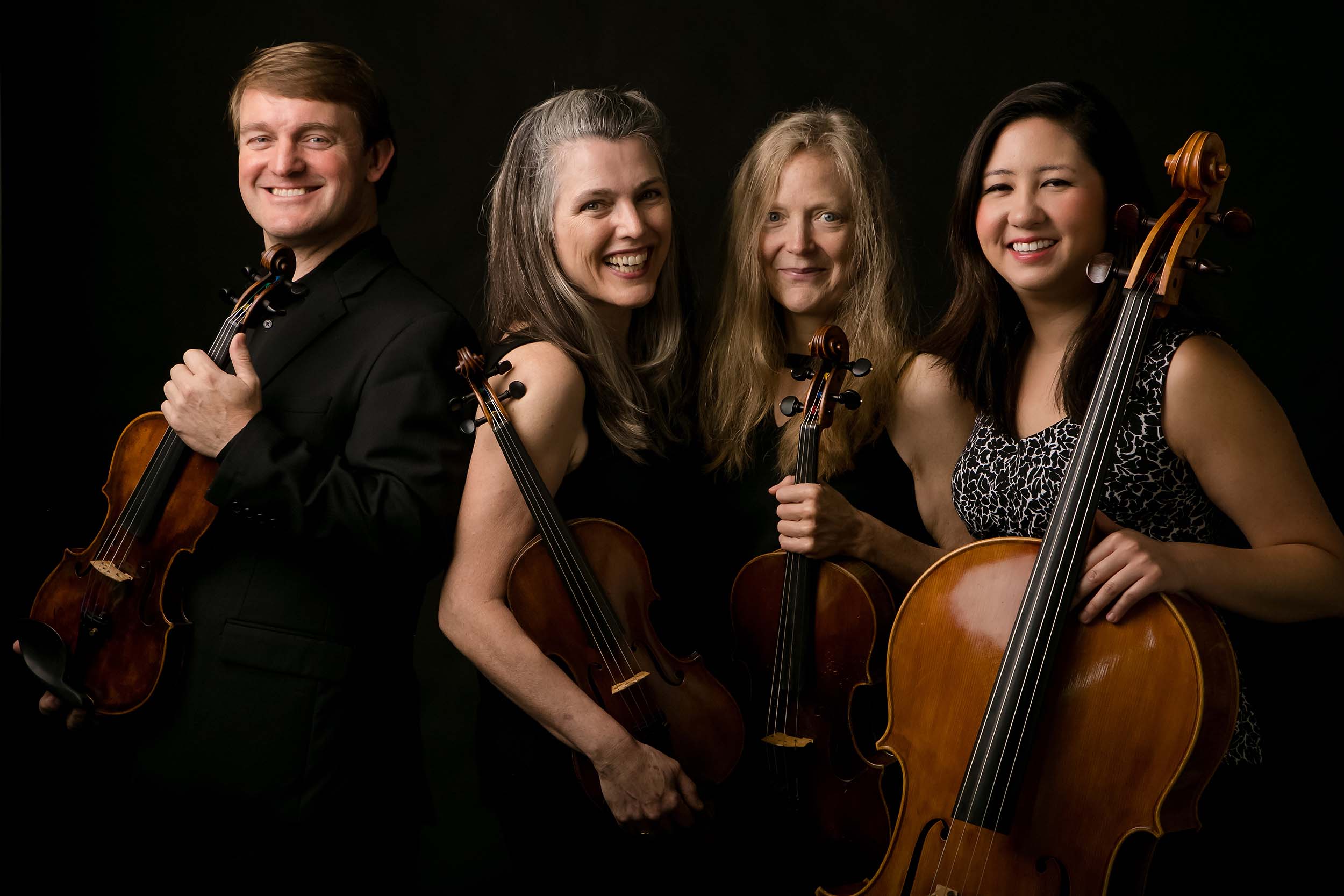Artaria String Quartet Virtual Concert and more...

This concert is sponsored by Chuck Head
on the eve of the 76th birthday of Lois,
his wife of 39 years.
We also thank William Branson & Kate Gill for their support as sponsors for Artaria’s concert that was originally scheduled March 2020.
Explore More! with the Artaria String Quartet
ARTARIA STRING QUARTET
Saturday, March 27, 2021, 7:30 pm
GEORGE WALKER Lyric for Strings
RHIANNON GIDDENS At the Purchaser’s Option
FRANZ SCHUBERT String Quartet No. 15 in G Major, D 887
Download and View the Program Notes
“An exceptional ensemble with impressive confidence in its interpretations.”
— Pioneer Press
Pre-concert Interview
Michael Barone talks with the Artaria Quartet
About this Performance
GEORGE WALKER Lyric for Strings (1946)
A string of firsts dominated George Walker’s long life and career. He was the first African American graduate of the prestigious Curtis Institute of Music with a dual diploma in both piano and composition. In 1945, he was the first African American to debut with a solo recital at Manhattan’s Town Hall and the first to perform with the Philadelphia Orchestra as the soloist for Rachmaninoff’s Piano Concerto No. 3. In 1950, he became the first African American artist to sign with a major artist management company, and he spent the next several years playing a string of high-profile concerts in nearly every European capital. In 1956, Walker became the first African American to graduate with a doctoral degree from the Eastman School of Music. In 1961, he was hired by Smith College where he became the first tenured African American faculty member in any department. And finally, in 1996, Walker was the first African American to be awarded the Pulitzer Prize for Music in recognition of his composition Lilacs for voice and orchestra.
At his death in August 2018, Walker was one of the most decorated and revered composers in American history. Lyric for Strings was composed when Walker was only 24 years old, but it has remained one of his most enduring compositions. The sound, structure, and instrumentation of the piece are all clearly inspired by the famous Adagio for Strings composed by Walker’s Curtis Institute classmate Samuel Barber in 1936. Walker first conceived the music that became Lyric as a middle movement for his first string quartet and originally titled it “Lament” in dedication to his grandmother who died the year prior. The piece fluidly and dramatically alternates between lush harmonies and stark solo passages which showcase the range of sounds possible in the string orchestra. In an interview not long before his death, Walker commented: “I never played a string instrument, but somehow strings have always fascinated me.” In Lyric, we hear the beginning of this life-long fascination.
RHIANNON GIDDENS At the Purchaser’s Option (2016)
Rhiannon Giddens’ At the Purchaser’s Option with variations is an instrumental variation of a song from her album Freedom Highway (Nonesuch, 2017), arranged by Jacob Garchik. She wrote the song after finding in a book a 19th-century advertisement for a 22-year-old female slave whose 9-month-old baby was also for sale, but “at the purchaser’s option.” This piece comes from that advertisement, and from thinking about what that woman’s life might have been like.
Giddens is multiethnic in ancestry, from her European-American father (David Giddens) and her African- and Native-American mother (Deborah Jamieson), who met as college students in the city of Greensboro, North Carolina.
FRANZ SCHUBERT String Quartet No. 15 in G Major, D. 887 (1826)
To explain Schubert is to explain a miracle, and we should attempt it only with the reminder that he said of himself: “It sometimes seems to me as if I did not belong to this world at all.” Indeed, he belonged to it so briefly that the size and impact of his output is astonishing. Within his short lifespan of 31 years, he composed no less than nine symphonies, twenty string quartets, two piano trios, a variety of other significant chamber works such as the famous “Trout” Quintet and C Major Quintet, numerous operas, 21 piano sonatas as well as other solo piano works including the Wanderer Fantasy, two glorious sets of impromptus, and the remarkable F Minor Fantasy for four hands. Looming over all this is his vast catalogue of over 600 songs.
The impact of Schubert’s work is no less astonishing than its size. Although he received little recognition within his lifetime, his works represent a profound development in music history. Schubert managed to culminate a period of music and forge another. Within the strictures of Classical form, he explored the Romantic spirit in a way foreign even to Beethoven.
Despite illness, depression, and persistent financial troubles, the last five years of Schubert’s life were remarkably productive: the song cycles Die Schöne Müllerin and Winterreise, the Symphony No. 9, the last three piano sonatas, the great Quintet in C Major, and the monumental D Minor Quartet of 1824, “Death and the Maiden,” Included in this impressive list of late works is the String Quartet No. 15 in G Major.
About the Artaria String Quartet
Ray Shows, violin
Nancy Oliveros, violin
Annalee Wolf, viola
Patricia Ryan, cello
Described as an “exceptional ensemble with impressive confidence in its interpretations” and “Minnesota’s foremost teaching and performing string quartet”, the Artaria String Quartet recently celebrated its 30 year of chamber music concerts. Winners of the 2004 McKnight Fellowship for Performing Musicians, and named 2013-14 Minnesota Public Radio Artists-in-Residence, Artaria was also featured on Twin Cities Public Television as part of the “Minnesota Originals” series.
Artaria’s refined and thoughtful playing has brought them to major venues throughout the United States and Europe, on national television and public radio stations, and at top summer festivals including the Banff Centre in Canada, Festival de L’Epau in France, and the Tanglewood Music Center in Lenox, MA.
Artaria has earned numerous awards from the National Endowment for the Arts, Chamber Music America, and the Minnesota State Arts Board for excellence in performance and educational outreach. Directors of the Artaria Chamber Music School, a premiere weekly string chamber music program in Saint Paul; and Stringwood Chamber Music Festival, featuring the ASQ and renowned guest artists every June in Lanesboro, MN; they are founders of the Saint Paul String Quartet Competition, which showcases the nation’s top high school age string quartets each April.

This activity is made possible by the voters of Minnesota through grants from the Minnesota State Arts Board and the Central MN Arts Board, thanks to a legislative appropriation from the arts and cultural heritage fund. This activity is made possible in part by a grant from the Central MN Arts Board with funds appropriated by the Minnesota State Legislature from its general fund.
These programs are only possible because of generous support of chamber music lovers like you, who have sustained our concert series for 42 years. We thank you for contributing as generously as you are able when viewing these programs. Gifts of any size are deeply appreciated.
This organization is funded, in part, by the voters of Minnesota through a grant from the Central MN Arts Board, thanks to a legislative appropriation from the arts and cultural heritage fund.


